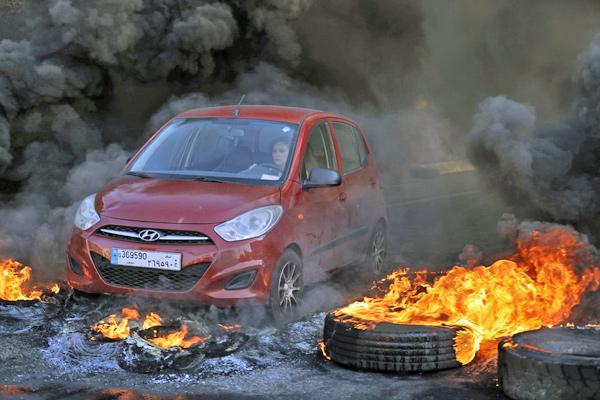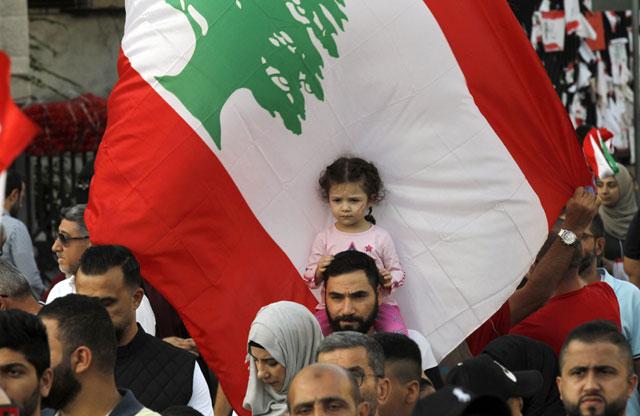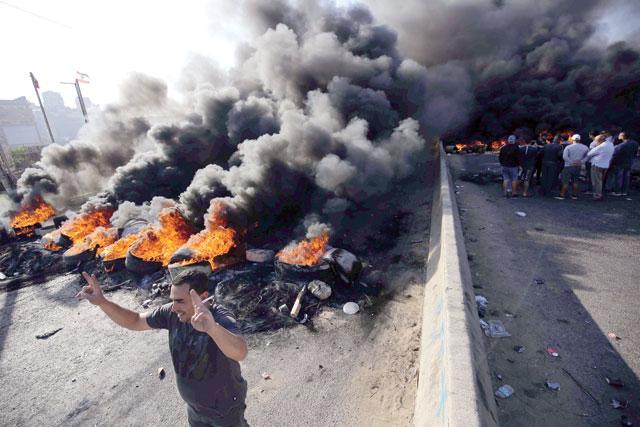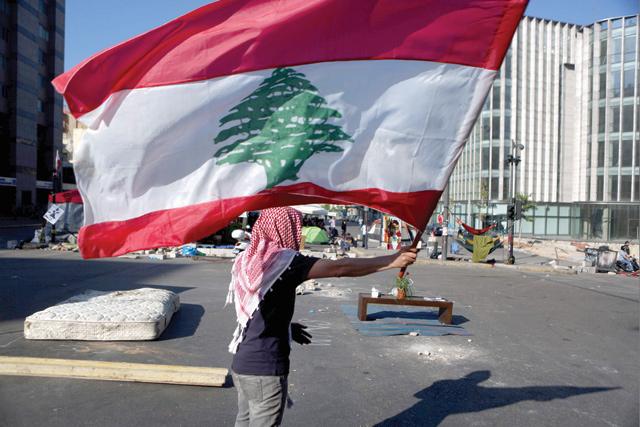You are here
Lebanon protests rage on as politicians stall
By AFP - Nov 04,2019 - Last updated at Nov 04,2019

A woman drives through burning tyres blocking a highway in Lebanon's northern port city of Byblos (Jbeil) during ongoing anti-government demonstrations on Monday (AFP photo)
BEIRUT — Demonstrators in Lebanon tried to block key roads on Monday after a weekend of mass rallies confirmed that political promises had failed to extinguish the unprecedented protest movement.
Nationwide cross-sectarian rallies have gripped Lebanon since October 17, demanding a complete overhaul of a political system deemed inefficient and corrupt.
The movement forced the government to resign last week and has spurred a raft of promises from political leaders, who have vowed to enact serious reforms to combat corruption.
But on Monday demonstrators battled on, vowing to keep up their street movement until all their demands are met, including the formation of a technocratic government.
"The people in power are not serious" about forming a new government, said Aadi, a 30-year-old demonstrator blocking a road that connects the capital to the southern city of Sidon.
"They think we are playing here."
In a now almost daily game of cat-and-mouse with riot police, increasingly organised protesters erected temporary road blocks using dumpsters and parked vehicles.
In the capital Beirut, they sat cross-legged on a key flyover and gathered near the central bank, which protesters blame for fuelling Lebanon's economic crisis.
Schools had been due to reopen on Monday after weeks of sporadic closures, but some remained shuttered as much of the country was on partial lockdown for a third Monday.
'New blood'
Lebanon's under-fire political class has repeatedly warned against the chaos a government resignation would cause, but they have yet to make progress on appointing a replacement.
President Michel Aoun has asked the outgoing government to stay on in a caretaker capacity until a new one can be formed, but Lebanon has entered a phase of acute political uncertainty, even by its own dysfunctional standards.
With a power-sharing system organised along communal and sectarian lines, the allocation of ministerial posts can typically take months, a delay demonstrators say the country can ill afford.
“The people and the politicians are living on two different clouds,” said Steven, a 34-year-old from the Bekaa Valley who was blocking a key flyover in Beirut.
“The president hasn’t even called on parliament to discuss the formation of a new government,” he added.
“Nobody is listening to us.”
One week after the government’s resignation, there had still been no consultations between the president and parliamentary blocs.
These are to look into who would lead the next government as well as the distribution of Cabinet posts among established parties and independents.
Yusef Fadel, a demonstrator in central Beirut, ruled out the possibility that the next government would include members of established parties.
“I reiterate, we are demanding a technocratic government and not a techno-partisan one,” said the 25-year-old who holds a masters degree in finance but remains unemployed.
“We need new blood.”
On Monday, Aoun called for dialogue with “protesters to reach an understanding”, and said fighting corruption was a priority.
“The investigation will include all officials, of all ranks, in all administrations,” he said on Twitter.
Cross-sectarian
Lebanon’s largely sectarian political parties have been flat-footed by the cross-communal nature of the demonstrations.
Waving Lebanese national flags rather than the partisan colours normally paraded at demonstrations, protesters have been demanding the resignation of all of Lebanon’s political leaders.
Such was the scene on Sunday, when tens of thousands took to the streets across the country.
“All of them means all of them,” they chanted, calling for political leaders from all sectarian stripes to step down.
Draped in white sheets, three demonstrators staged a mock execution of the grievances that pushed them down into the street.
Nooses around their limp necks, they bore signs referring to corruption, sectarianism, and the 1975-1990 civil war.
Sunday’s mobilisation followed a large rally organised by Aoun supporters in front of the presidential palace.
Aoun’s supporters said they backed the overall demands of anti-graft protesters, but insisted the president was the only man able to bring about reforms.
The president has said the members of the next government should be picked on merit, not political affiliation, seemingly endorsing protester demands for a technocratic government.
On Sunday, he urged the Lebanese to rally behind a roadmap to tackle corruption, redress the economy, and put together a civil government.
But he is also thought to be insisting on keeping his son-in-law Gebran Bassil, who is Lebanon’s foreign minister and one of the most reviled figures among protesters, in government.
Related Articles
BAABDA, Lebanon — Lebanon's president Sunday called on citizens to unite behind reforms, after more than two weeks of nationwide anti-graft
BEIRUT — Lebanese protesters blocked main roads Wednesday, angered by what they saw as the president ignoring their demands in nearly a mont
BEIRUT — The resignation of Lebanon's government under pressure from the street looked set to ease a two-week-old nationwide lockdown but pr














